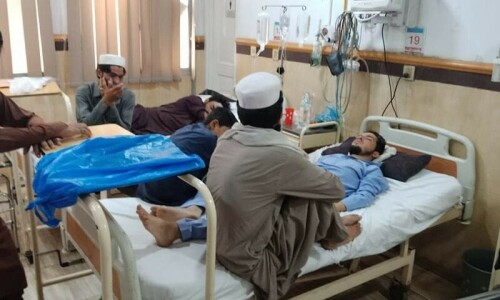SHAH JIWANA: Rhythmic drums and spirited dancing are once again bringing life to the shrines of Sufi saints, where festivals were long stifled by the threat of violence.
As the harvest season ends and schools close for the summer, villagers climb atop tractor trolleys, buses and rickshaws to head to the annual celebrations at shrines dotted across the country.
“Those who cannot meet during the rest of the year reunite at the fair,” said Muhammad Nawaz, a farmer, at the annual Shah Jiwana mela in Jhang.
“These fairs and Punjab’s culture share a profound connection, one of love and brotherhood.”
Fairgrounds, musicians, traditional wrestlers and motorcycle acrobats delight pilgrims lit by lanterns of all colours — but always under the watchful eye of hundreds of police officers.
Centuries-old Sufi orders across the Islamic world have millions of followers, from Turkey to South Asia, and their beliefs are rooted in mysticism and a devotion to saints.
Many orthodox hardliners consider their beliefs heretical, and militant groups such as the Tehreek-i-Taliban Pakistan and the so-called Islamic State have carried out bloody attacks at shrines and festivals in the past, leading authorities to ban or limit activities at these shrines, until recently.
“The goal was to avoid risking public lives,” said Alloudin Mehmood, a government official at Bari Imam shrine in Islamabad, which was targeted by a 2005 suicide bombing that killed 19 people.
Security has dramatically improved after several military operations, allowing celebrations to slowly return.
“Only after receiving security clearance was the festival permitted last year, ending a 16-year hiatus,” Mehmood added.
The event was shortened from five days to three, with mobile phone signals suspended for security reasons.
The landscape of rural Pakistan is adorned with thousands of Sufi shrines, varying in size from grand edifices to modest structures, each steeped in a tapestry of associated legends.
“Pilgrims find solace, healing, release and entertainment at these events that celebrate the ‘friends of God’,” said Carl W. Ernst, who has authored several books on Sufism.
Published in Dawn, May 30th, 2024













































Dear visitor, the comments section is undergoing an overhaul and will return soon.